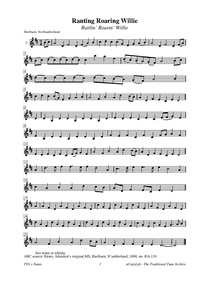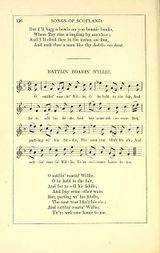Template:Pagina principale/Vetrina: Difference between revisions
No edit summary |
No edit summary |
||
| Line 5: | Line 5: | ||
|f_tune_name=Rantin' Roarin' Willie | |f_tune_name=Rantin' Roarin' Willie | ||
|f_track_title=Rantin'_Roarin'_Willie_(1) | |f_track_title=Rantin'_Roarin'_Willie_(1) | ||
|f_section= | |f_section=X4 | ||
|f_played_by=[https://soundcloud.com/danny-mcnab-93215924 Danny Mc Nab] | |f_played_by=[https://soundcloud.com/danny-mcnab-93215924 Danny Mc Nab] | ||
|f_notes= Glen Collection of printed music: Songs of Scotland prior to Burns. | |f_notes= Glen Collection of printed music: Songs of Scotland prior to Burns. | ||
Revision as of 07:55, 27 May 2023

Played by: Danny Mc Nab
Source: Soundcloud
Image: Glen Collection of printed music: Songs of Scotland prior to Burns.

Old and New Edinburgh, vol. 2 (p. 55) gives that Burns’ poem was inspired by a member of the Crochallan Fencibles, a convivial society in Edinburgh that met at Dawney Douglas’s tavern, to which Burns was introduced in 1787. The member’s name was Wiliam Dunbar, W.S., and he was the “Colonel” of the club and a predominant wit. A different tale has it that Rattlin' Willie was a wandering fiddler famous as both a musician and as a brawler in the Jedburgh (Jeddart) area, whose "sword-hand was dreaded as much as his bowing arm was admired". He fell out with another fiddler named Robin Rool (Robin of Rule Water) after an argument over their respective musical abilities and in the fight that ensued Robin was killed. His death was avenged at the hands of two of the Elliots, who in turn slew Willie. Scott alludes to Rattlin' Roarin' Willie (described as “the jovial harper”) in his The Lay of the Last Minstrel, noting that he was a real person. Other accounts say that Willie, still a ‘rantin’, roarin’ lad, lived in the 17th century and did business in the Hawick and Langholm districts, until, having had the misfortune to murder a brother in trade who passed by the name of 'Sweet Milk', he was executed at Jedburgh. Neil (1991) quotes the following verse:
The Lasses of Ousenam Water
Are rugging and riving their hair,
And a' for the sake O' Willie—
They'll hear his sangs nae mair,
Nae mair to his merry fiddle
Dance Teviot's maidens free;
My curses on their cunning
That gar'd sweet Willie dee!
...more at: Rantin' Roarin' Willie - full Score(s) and Annotations
X:4 T:Rattling Roaring Willie [1] M:9/8 L:1/8 B:Complete Tutor Violin (c. 1815) Z:Dr. Evan Jones, 2005 K:A U:T=!trill! %%graceslurs false V:1 clef=treble name="4." [V:1] f | ecA ABA cef | (=g3 {fg}) BGB d2g | ecA ABA ceg | T(a3{ga}) ecA e2 f/g/ | {b}agf ecA cef | (T=g3{fg}) .B.G.B Td2B |ABA Tc2 A cea | cAc BGB A2 :| |: f | ecA acA ecA | B=GB gdB Td2 f | ecA bcA ecA | {b}agf ecA efg | {b}agf ecA cef |{b}=gfg BGB Td2 B | ABA Tc2 A cea | cAc BGB A2 :|]
